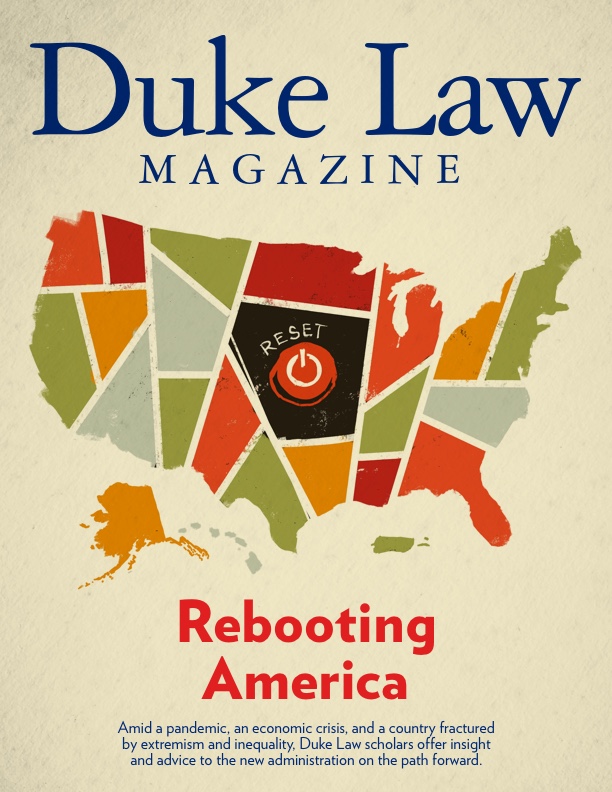John Weistart and Denise Thorpe ’90: Advocating for Lithuania’s children
Professor Emeritus John Weistart and his wife, Denise Thorpe ’90, have been, for more than a decade, deeply engaged with Lithuanian children who, due to family trauma or loss, live in state-run institutions. In addition to establishing The Foundation for Lithuania’s Children to facilitate fundraising, they have initiated a number of infrastructure upgrades at these homes and advocated for children’s rights and improvement of adoption procedures. Weistart is now working on a series of policies to help ensure children’s well-being as Lithuania develops its foster-care system as an alternative to children’s homes.
Ieva Giedrimaite, an attorney and Dublin-based contracts manager and negotiator, has worked closely with Weistart and Thorpe in Lithuania. She offers this reflection and tribute.
I met John and his wonderful wife Denise back in the early 2000s on one of their first trips to Lithuania. I believe John first set off to this remote (and at the time not easily accessible) Baltic country in pursuit of contextualising his Lithuanian heritage. People who know how curious John is will not be surprised to learn that this initial interest soon became just one of his many undertakings in the land of his ancestors. Among other activities, John started teaching at a law school in the capital city of Vilnius, gathered English language books for local universities, and embarked on a journey back in time to Zemaitija, the ethnical region where his grandfather was born. He even started learning Lithuanian, which is one of the oldest and most complex languages in the world.
John’s primary focus soon shifted to the Lithuanian orphanages, in particular, a baby home and a children’s home in the provincial town of Alytus, which he and Denise started visiting regularly, sometimes multiple times a year. At that time, Lithuania had been an independent state for just over a decade and a huge Soviet shadow still loomed over its institutions, infrastructure, and, indeed, people’s mentality. But John and Denise visited the children with their hearts wide open. Their persistence, fuelled by pure love and care, earned the trust and friendship of the local communities both at the orphanages and among a broad network of friends from all corners of the country. Probably there isn’t a single friend or relative of Denise and John’s who has not yet been to Alytus orphanages to share what they have and to help.
John and Denise initiated a sibling visiting program at the children’s homes. In many cases, little brothers and sisters lived in a baby home and their older siblings would only meet them at the age of six. John and Denise understood that an important bonding opportunity would be irreversibly lost by then so began introducing the older children to their younger siblings to inspire a feeling of belonging and family.
John and Denise also organised extra-curricular education and entertainment for the children which was otherwise scarce in their lives. Among their initiatives: They took children to a basketball match — a game that is akin to a religion among the Lithuanian people — invited them to dinners where the kids could spend time in small groups and order the meals they desired, and brought professional artists from Vilnius to lead art workshops.
While during their early trips John and Denise rented an apartment in Vilnius and drove daily to Alytus — a trip of more than 60 miles — they started staying locally so they could be with the children from breakfast until bedtime. They would go from one group to the other, cuddling the little ones and listening to the older ones, playing games, cracking jokes, encouraging, and inspiring. They know every single child by name, their life stories, their interests and challenges. They have been taking children’s photographs for years, printing them and bringing back as keepsakes. These are often the only pictures the kids have of their early days.
Denise and John also started a birthday present project. The presents are purchased and wrapped by their family and friends in the U.S. and shipped to Alytus. Every baby and child gets a dedicated present on their birthday to demonstrate how special and important they are.
I remember Denise and John coming to Alytus for Christmases, a time when most of the children are either taken by their relatives for the season festivities or visit French and Italian families that take part in fostering programmes. Children who stay for Christmas at the orphanages are the ones who have nobody. John and Denise opened their hearts to these little souls offering nothing less than parental love, happy memories, and nurturing of their hopes and dreams. John and Denise have become these children’s family, their hope, a light in their broken hearts. Individual attention, care, and love in an institutionalised care setting has and will have a profound impact on the children. It is evidenced by a momentary joy and smiles given back when asked about their day, by little hands stretching for a hug, and quiet whispers of the words “Mom” and “Dad,” and also by difficult adulthood decisions taken later in life and raising their own families.
A couple of years ago John organised an orphanage alumni meet-up in London for anyone who had emigrated to the United Kingdom. Little girls and boys had blossomed into men and women and started their own independent journeys. Even though they are not always equipped with all the necessary socio-economic tools to make the right decisions, at all times they continue to have each other’s back and share the love that John taught them.

